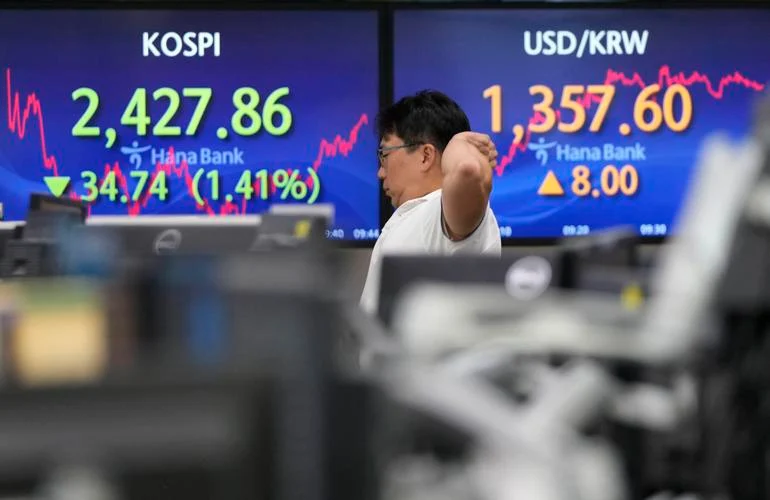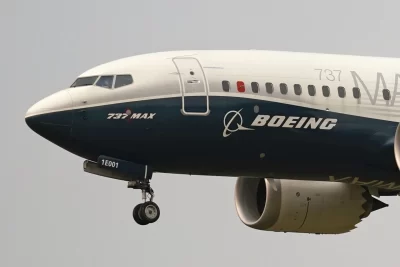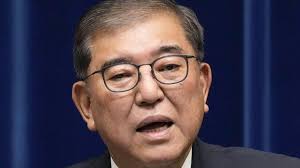
Shares tumbled in Asia on Thursday following a retreat on Wall Street after big U.S. companies delivered mixed profit reports and Treasury yields added pressure on stocks.
Worries about war in the Middle East also are dragging on markets.
Benchmarks in Hong Kong, Tokyo and Seoul fell about 2%.
Japan reported its exports swung into positive territory in September as vehicle shipments surged.
Exports rose 4.3% while imports sank 16.3% in September and the trade balance swung to a surplus of 62.4 trillion yen ($410 billion). Exports to the U.S. were up 13% while those to the rest of Asia declined 4.3%.
Tokyo’s Nikkei 225 index lost 2% to 31,418.01 and the Kospi in Seoul lost 1.8% to 2,417.70.
Hong Kong’s Hang Seng index declined 2% to 17,379.66 and the Shanghai Composite index was down 1%, at 3,021.55. Australia’s S&P/ASX 200 sank 1.7% to 6,955.50.
India’s Sensex was 0.7% lower and Bangkok’s SET fell 0.8%.
“Another surge in Treasury yields, lingering geopolitical tensions in the Middle East and higher oil prices seem to dampen appetite in risk-taking for now,” Yeap Jun Rong of IG said in a report.
A big threat for the global economy is what oil prices will do to inflation. Crude prices jumped sharply on Wednesday following a deadly explosion at a hospital in the Gaza Strip, which sparked protests across the Middle East.
Early Thursday, U.S. benchmark crude oil was down 32 cents at $86.95 per barrel in electronic trading on the New York Mercantile Exchange. It had surged $1.83 on Wednesday to $87.27 per barrel.
Brent crude, the international pricing standard, fell 50 cents to $91.00 per barrel. It climbed $1.60 on Wednesday.
On Wednesday, the S&P 500 sank 1.3% to 4,314.60. The Dow Jones Industrial Average lost 1% to 33,665.08, and the Nasdaq sank 1.6% to 13,314.30.
Tesla’s share price fell 4.2% in afterhours trading after it reported its net income slumped in the third quarter, as price reductions helped drive strong sales growth but ate into the automaker’s profit margins.
Shares in Netflix jumped 12.8% in afterhours trading after it disclosed summertime subscriber gains that surpassed analysts’ projections, signaling the video streaming service’s password sharing crackdown is converting freeloaders into paying customers.
United Airlines slumped 9.7% after it said surging fuel prices and the suspension of flights to Tel Aviv will take a toll on its business. Its profit forecast for the final quarter of the year fell well short of analysts’ expectations.
Other airlines fell in concert, with American Airlines down 4.9% and Delta Air Lines down 4.4%.
Morgan Stanley tumbled 6.8% as investors focused on a weaker-than-expected showing by the company’s wealth management business, analysts said.
On the winning side was Procter & Gamble, the giant behind such brands as Charmin, Febreze and Oral-B. It rose 2.6% after reporting stronger profit than expected for the latest quarter as its revenue rose after it hiked prices.
The earnings reporting season for the summer is still in its early days, and the broad expectation is for S&P 500 companies to say their overall earnings per share rose last quarter for the first time in a year.
The yield on the 10-year Treasury surged to 4.95% early Thursday after topping 4.90% Wednesday for the first time since 2007, just before the global financial crisis. It was at 4.84% late Tuesday and in the spring was at less than 3.50%.
The sharp jump in yields followed a report by the Treasury Department showing Chinese investors sold off the most U.S. bonds and stocks in four years in August.
Yields have climbed as the U.S. economy has remained remarkably resilient, even after the Federal Reserve raised its main interest rate to the highest level since 2001. High rates and yields hurt prices for stocks and other investments.
In other trading early Thursday, the dollar fell to 149.80 Japanese yen from 149.93 yen. The euro was unchanged at $1.0536.
Gold lost $10.80 to $1,957.50 per ounce early Thursday. It rose $32.60 to settle at $1,968.30 per ounce a day earlier as investors looked for safer things to own.
___
AP Business Writers Stan Choe and Matt Ott contributed.







